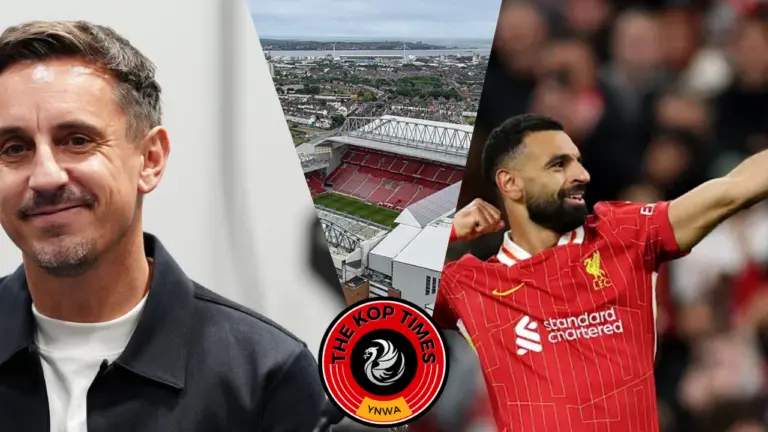Gary Neville’s latest comments on Liverpool have sparked intense debate among Reds fans and soccer enthusiasts alike, with many questioning the validity of his opinions and the quality of his punditry. Neville, a renowned former Manchester United defender and current Sky Sports pundit, has faced criticism for his perceived bias against Liverpool, and his recent remarks have only fueled the fire.
Neville’s assertion that Liverpool’s current squad lacks depth and quality has raised eyebrows, particularly given the team’s impressive performance in recent seasons. The Reds have consistently challenged for top honors, winning the Champions League in 2019 and narrowly missing out on the Premier League title in 2020. Neville’s comments seem to disregard these achievements, leading many to wonder if his Manchester United allegiance is clouding his judgment.
Moreover, Neville’s criticism of Liverpool’s transfer policy has been labeled as hypocritical, considering Manchester United’s own questionable recruitment decisions in recent years. The Red Devils have spent lavishly on players like Paul Pogba, Harry Maguire, and Jadon Sancho, yet their on-field performance has failed to match their expenditure. Neville’s failure to acknowledge these inconsistencies has damaged his credibility as a pundit.
Furthermore, Neville’s tenure as Valencia manager in 2016 has resurfaced as a point of contention. His ill-fated three-month stint in Spain was marked by poor results and tactical ineptness, leading to his eventual dismissal. Many argue that Neville’s lack of success as a manager undermines his authority to critique Liverpool’s decisions.
Neville’s punditsry has been called into question, with some labeling it as worse than his Valencia tenure. His tendency to focus on negative aspects of Liverpool’s game, while glossing over their positives, has alienated fans and pundits alike. His comments often seem designed to provoke rather than inform, damaging his reputation as a respected voice in soccer analysis.
The backlash against Neville has been swift and severe, with social media platforms overflowing with criticism. Fans and pundits have accused him of bias, ignorance, and a lack of objectivity. Former Liverpool players, including Jamie Carragher and Graeme Souness, have publicly disputed Neville’s claims, highlighting the team’s strengths and achievements.
In contrast, Neville’s Sky Sports colleague, Jamie Carragher, has earned praise for his balanced and insightful analysis. Carragher’s willingness to criticize his former team when necessary, while also acknowledging their accomplishments, has cemented his reputation as a credible and knowledgeable pundit.
The disparity between Neville’s and Carragher’s punditry styles has sparked a wider debate about the role of pundits in modern soccer. While Neville’s opinions often seem driven by personal agendas or biases, Carragher’s analysis is grounded in objective observation and expertise. This contrast highlights the importance of credible and informed punditry in enhancing the viewer’s experience.
Gary Neville’s latest comments on Liverpool have reignited concerns about his punditry and its potential impact on the sport. His perceived bias, hypocrisy, and lack of objectivity have damaged his credibility, leading many to question whether his opinions hold any value. As the soccer world continues to evolve, the importance of informed and balanced punditry has never been more pressing.
Gary Neville’s Valencia tenure may have been short-lived, but its legacy continues to haunt him. His failure to adapt as a pundit, acknowledging his own limitations and biases, threatens to undermine his entire broadcasting career. As the debate surrounding his comments rages on, one thing is clear – Neville must reassess his approach to punditry or risk becoming an irrelevance in the world of soccer analysis.
Fans and pundits alike will continue to scrutinize Neville’s every word, searching for signs of growth and objectivity. Until then, his opinions will remain tainted by the perception of bias and ignorance, forever linked to his ill-fated Valencia tenure. The ball is firmly in Neville’s court – will he rise to the challenge and redeem himself as a respected voice in soccer analysis, or will his punditry continue to suffer in the shadow of his Valencia failure?




















